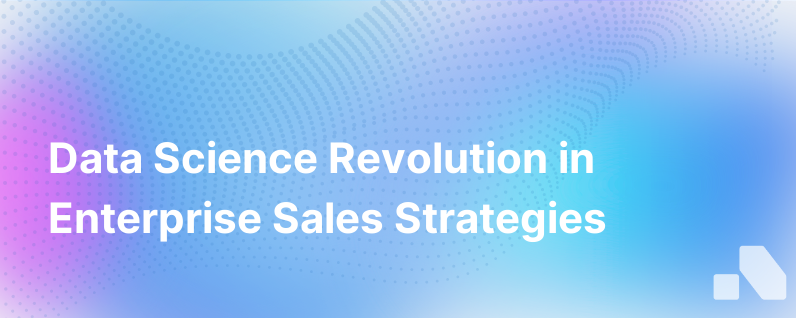
In the dynamic realm of enterprise sales, staying ahead of the curve means constantly adapting to new methodologies, technologies, and buzzwords. Lately, one phrase resonates across boardrooms and sales floors with the promise of unlocking unprecedented insights and competitive advantages: data science.
Data science has emerged as a beacon for enterprises aiming to not only navigate but also dominate their respective markets through data-driven decision-making. It leverages statistical analysis, machine learning, predictive modeling, and a suite of other quantitative techniques to decipher complex patterns within vast datasets.
Let's embark on a journey through the landscape of data science and its profound impact on enterprise sales practices.
The Inception of Data-Driven Sales
Historically, enterprise sales relied heavily on the instincts of seasoned sales professionals. Relationships and persuasion were king. However, the digital revolution brought forth an avalanche of data, and with it, new territories to conquer.
The shift towards a data-centric approach began with metrics and KPIs but soon evolved into a quest for deeper understanding. Today, it is not merely about 'having' data but about harnessing it effectively. Herein lies the role of data science – transforming raw information into actionable intelligence.
The Domain of Data Science in Enterprise Sales
In the context of enterprise sales, data science is multifaceted. It not only informs strategies but also optimizes operations on several fronts.
- Lead Prioritization and Scoring: By analyzing historical deal data and market signals, data science algorithms can prioritize leads that are most likely to convert and help sales reps focus their efforts where they count.
- Customer Segmentation and Personalization: Advanced clustering techniques divide customers into distinct segments based on behavioral data, thus tailoring interactions and offers precisely.
- Predictive Analytics: Predictive models forecast future sales trends, customer behavior, and revenue opportunities, empowering sales leaders with foresight.
- Sales Performance Analysis: Data science demolishes guesswork by pinpointing performance drivers and bottlenecks across sales teams.
- Market Basket Analysis: Understanding product affinities and customer purchase patterns leads to strategic bundling and cross-selling opportunities.
The fusion of these techniques paints a fuller picture of the sales cycle, leading to informed, strategic decision-making that aligns closely with customer needs and market dynamics.
Implementing Data Science: Challenges and Considerations
While data science in sales resonates with promise, its adoption is not without obstacles:
- Data Quality and Integration: Effective data science requires clean, integrated data from various touchpoints. Many enterprises face the challenge of siloed data and inadequate infrastructure.
- Talent Gap: The demand for data scientists outpaces supply, posing a recruitment challenge. Additionally, there is a need for sales personnel who can interpret and act on data insights.
- Change Management: Introducing data-driven processes can disrupt established cultural norms and resistance may arise.
- Ethical and Privacy Concerns: Leveraging customer data necessitates navigating the complex terrain of user consent and privacy laws.
Overcoming these barriers requires not just technology, but strategic planning, upskilling teams, and fostering a culture that values data-centricity.
Success Stories: Data Science Transforming Sales
Luminaries across industries bear witness to the transformative power of data science. Here are a few examples:
- A global software firm implemented machine learning to score leads, resulting in a 20% increase in lead-to-opportunity conversion rates.
- An e-commerce titan used predictive analytics to forecast demand, enhancing supply chain efficiency and reducing holding costs.
- A leading telecommunications provider employed customer segmentation strategies refined by data science, boosting customer retention rates.
These successes underscore not just the versatility of data science but also its tangible impact on the bottom line.
The Symbiosis of AI and Data Science in Sales
As data volumes explode beyond human scale, artificial intelligence (AI) systems – powered by data science – take center stage. AI can analyze more data more deeply and at higher speeds than humanly possible. For example:
- Chatbots using natural language processing aid in lead qualification and customer service.
- Recommendation engines, fueled by AI, offer personalized product suggestions to customers.
The integration of AI extends the capabilities of data science, creating a virtuous cycle that continuously enhances the sales process.
The Future Outlook: Data Science and Enterprise Sales
Looking to the horizon, the confluence of data science and sales holds immense potential. Real-time analytics, the Internet of Things (IoT), and the proliferation of unstructured data (text, images, videos) will call for more sophisticated data science solutions.
Investment in these technologies signifies a growth trajectory moving from reactive data analysis to proactive intelligence generation and autonomous decision-making.
Aomni: Empowering Sales with Data Science
In conclusion, the synthesis of data science and enterprise sales is not a mere trend; it's a paradigm shift towards a more scientific approach to sales. Harnessing data science’s vast potential can propel B2B sales into a new era of efficiency, precision, and success.
At Aomni, we stand firmly at this intersection, ready to empower sales teams with AI-enhanced sales tools and insights. With Aomni, sales teams can leverage the cutting-edge power of data science effortlessly, gaining a competitive edge in the rapidly evolving marketplace.